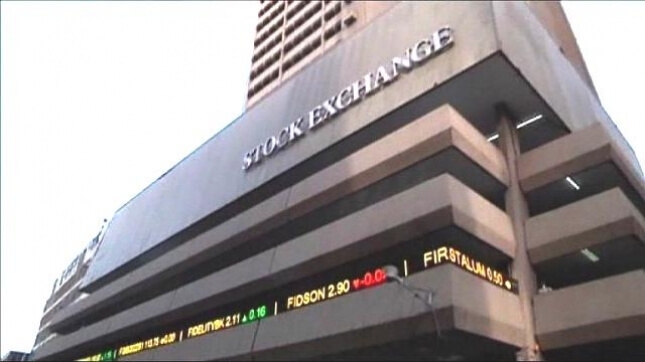
According to a data released by the Nigerian Stock Exchange, the market recorded a loss of N1.73trn within one year of President Muhammadu Buhari’s administration.
The data indicated that within the period from May 28, 2015 to May 27, 2016 the NSE market capitalization crashed from N11.658trn to N9.926trn.
The NSE All-Share Index also fell to 28,902.25 basis points from 34,310.37 basis points.
Advertisement
Market capitalisation is the total market value of the shares outstanding of a publicly traded company.
This is not coming as a surprise to many because within the past one year many investors shunned the country because of the prevailing economic situation. With Investors in the country’s capital market (equity category) losing over N1.053tn in the first quarter of 2016.
Recall that on March 31, 2015, following President Muhammed Buhari’s victory at the 2015 Presidential Elections, the Nigerian Stock Exchange’s All Share Index recorded a remarkable improvement with about 10 straight days of gains as investors basked in the excitement of a peaceful election and surprising acceptance of defeat by President Goodluck Jonathan.
However, things changed thereafter with investors leaving the country en masse due to the volatility of the market majorly as a result of the dwindling oil prices and policy reversal by the Central Bank of Nigeria, CBN, and foreign exchange restrictions.
Advertisement
Data obtained from the CBN’s website showed that investors’ confidence weakened from 25.3 per cent to 41.5 per cent in the period under review due to deteriorating banks’ balance sheet due to rising non-performing loans.
For instance, the Gross Domestic Product, GDP, fell to historic low of 2.75 per cent, a decline of 0.4 per cent from May 29 when Mr. President assumed power.
The equities market also depreciated by 10.79 per cent in the first quarter (Q1) of this year, as at the first day of trading the NSE market capitalisation stood at N9.757tn, while the All-Share Index was 28,370.32 basis points. However the index tremendously to N8.704tn and 25,306.22 basis points, respectively.
The market capitalisation of the NSE fell by N811bn in the first 10 weeks of trading in 2016.
The President, Nigerian Stock Exchange, Mr. Aigboje Aig-Imoukhuede, last week, said the country must proffer ways to grow the economy, and according to him Africa’s largest economy can no longer lag behind in the global arena.
Advertisement
He said the capital market must facilitate capital raising for economic growth as well as mobilise savings for investment.
The NSE boss further advocated for incentives for priority economic sectors like Information and Communications Technology, while pushing for non-listed national champions to be listed on the NSE for others to follow.
He described the Nigerian financial market as a ‘high-risked’ market, saying the situation was capable of attracting limited investors who could ultimately stop at nothing to maximise returns
He said, “Nigeria is facing a huge growth challenge. Nigeria, indeed, has a big challenge in terms of growth. Employment rate must grow owing to the fact that the population is also growing very fast. Growth is difficult to realise; so, government must stimulate growth.
“Nigeria is only exaggerating the impacts of falling oil prices now. This is because with a robust financial market the economy can be sustained. The financial market must be encouraged.”
Also Commenting on the performance, a stockbroker and Chief Executive Officer of Highcap Securities Limited, Mr. David Adonri said the market declined because of lingering energy crisis rising inflation and general low confidence in the economy.
Advertisement
“However, dividend yield was quite high due to low prices of stocks,” he said.
Despite all its negative sides, the market last week witnessed a pull back, reacting positively to a combination of the recent passage of the 2016 budget into law and the decisions of Central Bank of Nigeria’s Monetary Policy Committee to hold the benchmark rate.
At the end of Friday’s trading, the All-Share Index closed positively with returns of 0.91 per cent for the first time this year.
Early in the year, the Chief Executive Officer of the NSE, Mr. Oscar Onyema had expressed optimism that with greater clarity on policy direction, they anticipated the return of investors who had remained on the sidelines throughout 2015.
“This return is predicated upon return of investor confidence as a result of: effective implementation and communication of the government’s economic blueprint; credibility in monetary policy stance; relative stability in the macro economy (oil price stability above benchmark targets, increase in tax collection to gross domestic product among others) and improved security,” he said.
“To this end, we intend to intensify engagement efforts with the federal government. We have also prioritised three initiatives for 2016 aimed at achieving the exchange’s three strategic objectives of increasing the number of new listings across five asset classes, increasing order flow in the five asset classes operating a fair and orderly market based on just and equitable principles,” Onyema added.


